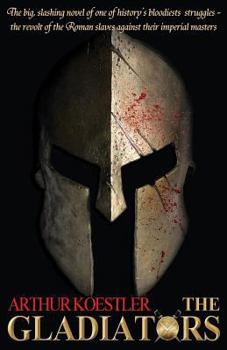The Gladiators
Select Format
Select Condition 
Book Overview
Entre los años 73 y 71 a.C., los gladiadores obligados a luchar y morir para diversión de los ciudadanos de Roma protagonizaron uno de los episodios más emocionantes, violentos y sorprendentes de la... This description may be from another edition of this product.
Format:Paperback
Language:English
ISBN:1939438497
ISBN13:9781939438492
Release Date:April 1981
Publisher:One 70 Press
Length:322 Pages
Weight:0.40 lbs.
Dimensions:0.7" x 5.5" x 8.5"
Related Subjects
Classics Contemporary Fantasy Fiction Literature & Fiction Science Fiction & FantasyCustomer Reviews
2 ratings
A masterful rendition of an heroic and grimy story
Published by Thriftbooks.com User , 21 years ago
Spartacus is all of us when threathened in our human dignity, in our right to live, when we think we must fight oppression,the menace of terror and the tyranny of corrupt men of power. The Spartacus in this book is not as scintillating as Kubrick's Spartacus. He's more grim, much more conscious of the problem of restraining, in the rebellion to the tyranny of terror, the temptation of wreaking even more terror, and to give vent to the less rational and more violent and predatory instincts in human soul. Koestler's book poses problems who are far from resolved in the wake of the death of "the God that failed", of Communism. His questions are today's questions. Besides that,this is one of the more rigorous historical books I've read, and even if some speculations are a bit hazardous,they are entirely plausible.A good historical novel,
'Eat, Or Be Eaten'!...
Published by Thriftbooks.com User , 21 years ago
This is a deeply disturbing novel about the failure of mass revolutionary movements. It contrasts the conscious self-interests of privileged elites with the self-interests of the masses and observes that there is only one fundamental 'law' that operates beneath the facades of 'order' and 'patriotism', namely the fatalistic assertion of the sad leader of the fierce and melancholic Celts, the gladiator Crixus, that the law is simply 'Eat, or be eaten'!Every ideal of human progress is punctured in Koestler's often unnoticed and underrated novel, yet -- as asserted in the chapter in which 'the man with the bullet-head', an Israelite Essene, inspires the Thracian gladiator Spartacus with a vision of universal justice from the latter Jewish prophets -- the tattered nobility of this defeat is reminiscent of the Christian version of a death on a cross that was also to lead to some final victory over brute nature. And Spartacus, at the end of the book, walks post-mortem, like a resurrected Jesus, among the devastated; his vision they refuse to let die.Based upon the historic revolt of 73-71 B.C.E. (Before the Common Era) this actual event was one of the great revolutions of ancient history, a slave revolt that threatened the power of the Roman empire; a revolt -- if it had succeeded -- that would perhaps have mirrored the triumph of the Bolshevik revolution in Russia in 1917-20. Lenin's favorite character in history is said to have been precisely the gladiator of the school in Capua, Spartacus, who emerged as the primary commander of the slave forces; however, the real leader, in Koestler's novel, is the gladiator without ambition or ideals, 'the man with the seal's head', Crixus.Crixus is the expression of vengeance as justice and indulgence as the compensation for privation and exploitation, understanding that the rich and the powerful always win in the end so the only sensible response is to take everything you can while you can. It is an ignoble, even ignorant, attitude, but the cynicism of the fat, equally self-indulgent (and also deeply unhappy) Roman banker-become-general, Marcus Crassus, quite reflects Crixus' own. (In a scene of a pre-'last battle' interview between Crassus and Spartacus, the latter actually notes even the physical resemblance between the rich man and the proletarian slave-gladiator which of course is a recognition of kindred motivation, the union of 'eaters' from 'above' and 'below', so to speak.)There is plenty of mayhem in this book but essentially it is for those who are willing to ask questions about base human nature and live with the results. The characterizations are finely drawn, complex and varied, and the novelized history is fascinating. This is a much less romanticized version of the Spartacus story than the better-known book by Howard Fast (made into an even more romantic movie by Kirk Douglas in 1960). Koestler's would best be serialized by the BBC, similar to the excellent treatment Robert Graves' 'I, Claudius' no





